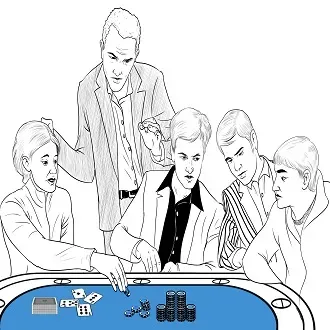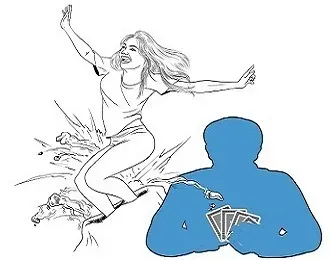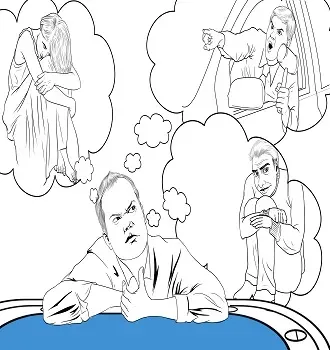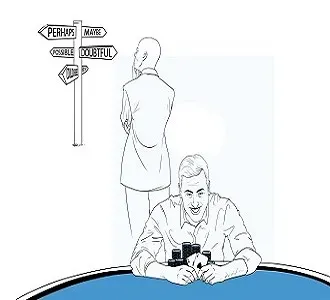When Poker Becomes Personal

In the last several years I’ve noticed a trend among the clients that came to me for poker coaching. They are typically players who read The Mental Game of Poker for help with poker tilt control, fear, motivation and confidence, but didn’t improve as much as they wanted. The book helped decrease the frequency and intensity of their Mistake Tilt, for example, but they still tilt more than they want to. I refer to this situation as when poker becomes personal. So, how do we confront and correct this?
For many players, this poker strategy book identified issues they didn’t know were even affecting their game. It also gave them the theories and methods I use to solve the most common mental game issues. But this meant each player was responsible to accurately determine the cause and correction to their problem. If they get it wrong, improvement is still possible, but the problem is unlikely to be eliminated entirely.
In my poker video below, I go over the pitfalls in poker and introduce what that can help you cope and overcome them.
Use the Right Poker Strategy to Deal with Issues

Getting it right can be a challenge even for me and I’ve been doing this kind of work for more than a decade. Some players got it wrong because they had the right poker strategy, but didn’t apply it often enough.
Others were missing key pieces of the puzzle, like the real cause of their lack of motivation was actually an underlying tilt problem.
So, they used poker training methods for resolving a motivational problem when they needed to be focused on correcting their tilt. Most often, however, players were on the right track but didn’t realize that poker had exposed issues that were deeper and more personal.
Everything Comes Out at the Poker Tables
We are people first and poker players second. When you have unresolved problems in your personal life they can spill out in poker—even ones you didn’t even know were a problem.For many players, poker presents a unique test that brings out their deepest held beliefs and issues. Here are some general examples:
- Growing up you hated to lose at anything you did. Even though losing no longer destroys your mentality for days like it used to, losing still feels like the end of the world.
- School and nearly everything you did came so easily that you didn’t need to work that hard to be among the best. Now you have trouble sustaining the motivation to put in the work needed to become the player you know you can be.
- Your parents had high expectations of you and that put a lot of pressure on you to succeed. Even though you’re successful in poker and elsewhere, your constant fear of failure causes you to be overly conservative with your bankroll and game selection.
- You were bullied or picked on as a kid, and now you have trouble dealing with aggressive players at the table. Either you fight back with unwarranted aggression or cower and become too tight or passive.
- When you were young, you constantly had dreams of making a lot of money, traveling the world, and being famous. Now you want results instantly and that causes you to force action in hands, jump up in stakes too quickly, and get overconfident when running well.
The Poker Pressure Cooker: What Really Makes You Tick?

When you invest so much of your time, energy, money, future, confidence and identity into poker these issues will eventually come out. Maybe not at first, but they will when you have a huge poker cooler, downswing, move up to stakes where the money is particularly meaningful, or decide to take the game seriously. These situations ratchet up the pressure and have a way of exposing problems that are rooted in the past. The key poker tip for both advanced and beginner players for accomplishing your goals could be, to simply resolve them.
The easiest way to identify if the issue is deeper than poker is to look for it in other aspects of your life. If you have road rage, get pissed off at the slightest inconveniences or problems, and also tilt at the tables, then you are likely dealing with a bigger anger problem. The same goes for issues with fear, motivation and confidence. Describe what these problems look like in poker and then look to see if they’re present elsewhere. Here are a few other examples:
- Do you constantly put off studying hand histories as recommended in many poker strategy articles and miss deadlines at work?
- Do you keep changing the formats whenever you struggle—jumping from cash to SNGs to MTTs, for example, and have trouble seeing a project through?
- Do you berate other players in the chat box, and constantly get into heated arguments with friends or family?
- Do you have trouble making poker decisions, and are indecisive in other aspects of life?
Keep a Log of Important Personal Issues
Sometimes the issues are obvious once you look and other times they’re harder to spot. For example, if you hate bad beats, poker coolers or suck outs, but otherwise handle bad luck well in the rest of your life. The difference could come from a deeper fear of failure. Bad luck in life hasn’t yet impacted your career or things you care about, but the lack of total control over your success in poker makes you worry about the potential of failing.

Keep notes about the issues you see popping up in poker and life and start thinking about where they came from. It is important to note that if you start delving into these personal issues, it’s possible you may want to work with therapists and/or poker coaches. I’m not saying that you should simply because you are not 3-betting enough from the Big Blind. However, some people may find that the issues are complex and hard to solve on their own.
There are also many good books and video poker strategy guides out there that you can refer to, and frankly I’ve heard from many readers that they had success improving some of their personal issues using my poker strategy guide - The Mental Game of Poker. Be practical about what you need to progress and avoid burying your head in the sand.
Don’t Bury Your Problems: Deal with Them
It’s also important that you don’t use exercise, meditation, yoga, or other activities to hide deeper problems. I’m not at all suggesting these are bad things to do. But they will not solve an anger issue, for example. If you need them to keep your head together or for a stress release, and would lose it if you didn’t, then it’s likely there’s a hidden issue to fix. This same pattern in poker happens when a player uses quitting to deal with tilt. Here’s a poker tip for tilting players: Quitting isn’t a solution to tilt, it’s a way of managing the problem to lessen the impact on your game. Look closer to see what issues these activities are helping to hide. Sometimes you may need to stop doing these things to see what that is. Just be sure to take good notes so your research is productive.
Helping players work through their personal issues is particularly meaningful for me. Impacting someone’s career is awesome, but it’s on another level when that success extends to their relationships, health, and self-confidence. Poker is often viewed negatively, even by poker players. I see another way, as an avenue for personal growth. The volatility of poker can be painful, but it strips bare what matters most to us and the areas where we can make real progress. When you can simultaneously improve as a player and a person, the game creates real value beyond just money.
